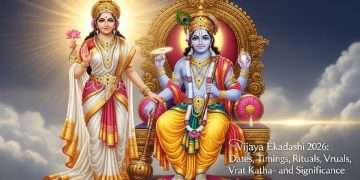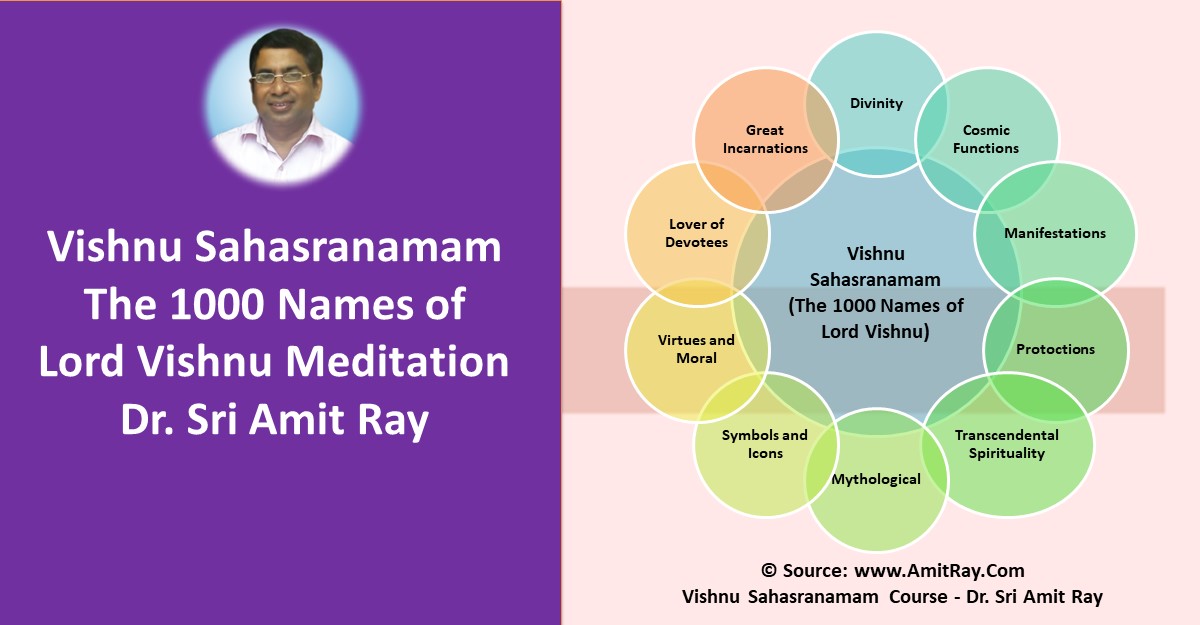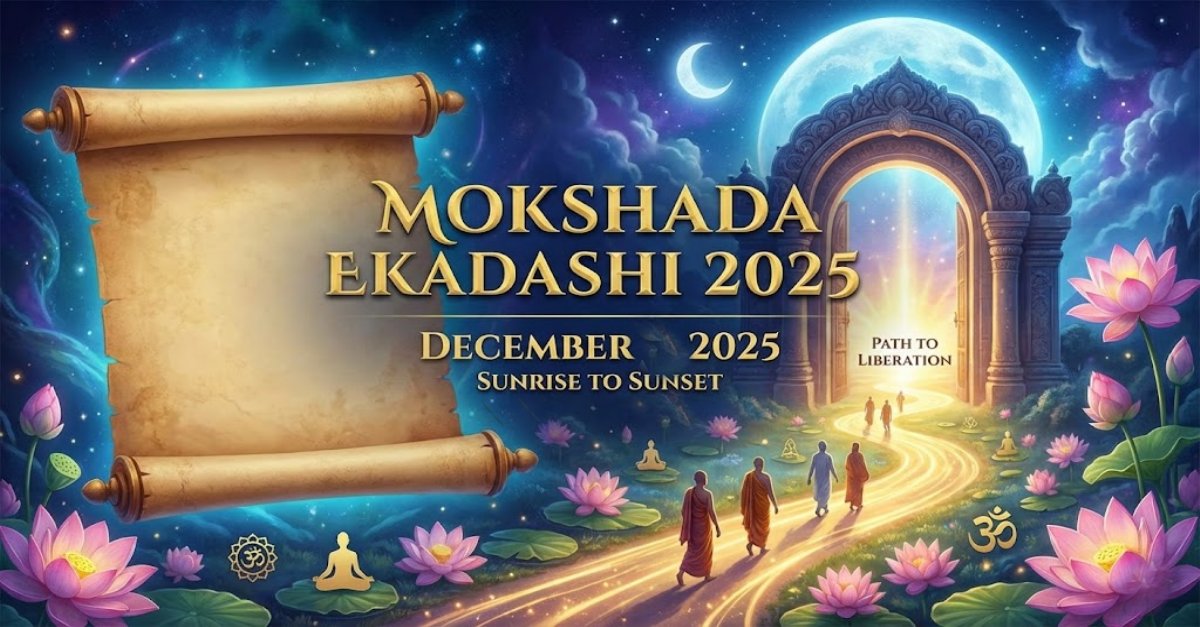Introduction
Vishnu Sahasranamam—the “Thousand Names of Lord Vishnu”—is one of the most sacred and powerful stotras of the entire Vedic tradition. Found in the Anushasana Parva of the Mahabharata, it was revealed by Bhishma Pitamaha to Yudhishthira on the battlefield of Kurukshetra as a powerful means to attain peace, protection, and spiritual upliftment.

For thousands of years, sages, householders, rishis, yogis, and kings have chanted these 1000 names to invoke divine grace, protection, healing, peace, prosperity, and moksha.
Today, it is considered the most accessible, swift, and universal mantra to transform the mind, cleanse negative karmas, and establish deep inner stability.
Introduction | Significance | Lyrics and Meanings | Meditation | Benefits | FAQ
Significance
The Sahasranama is a compact, dense hymn: each name describes an attribute or cosmic function of the Divine — from the most transcendent (Brahman, Absolute) to very practical functions (protector, healer, sustainer). Traditionally it is considered effective for purification of mind, removal of obstacles, and steadying devotion (bhakti).
A Map of Divine Attributes
Each of the thousand names highlights a particular quality, power, or mystery of Viṣṇu: preservation, compassion, omniscience, cosmic order, and more. Collectively the names form a layered mandala of metaphysical and ethical meaning that synthesizes:
- Dharma — the sustaining order and ethical law.
- Mokṣa — freedom from bondage and limitation.
- Jñāna — knowledge of the Self and reality.
- Śakti — the manifest power and compassionate energy.
Reading or listening to the Sahasranama is therefore like traversing a spiritual map: moving from outer qualities (protector, preserver) to subtle metaphysical identifications (Paramātman, Ananta).
Energetic & Psychological Benefits
Traditionally described as a form of sound-medicine, the Sahasranama produces measurable subjective effects when practiced regularly:
- Calms mental agitation and reduces anxiety.
- Improves focused attention and memory through rhythmic repetition.
- Promotes sattvic states — clarity, steadiness, and emotional balance.
- Creates nervous-system entrainment comparable to meditative practices.
These benefits are the reason recitation is recommended for mental health, concentration in studies, and spiritual preparedness.
Vishnu Sahasranamam Lyrics
शुक्लांबरधरं विष्णुं शशिवर्णं चतुर्भुजम् ।
प्रसन्नवदनं ध्यायेत् सर्वविघ्नोपशान्तये ॥
śuklāṃbaradharaṃ viṣṇuṃ śaśivarṇaṃ caturbhujam |
prasannavadanaṃ dhyāyet sarvavighnopaśāntaye ||
विघ्नं निहन्तु हेरम्बप्रसादात् गणनायकाः ॥
vighnaṃ nihantu herambaprasādāt gaṇanāyakāḥ ||
यस्य स्मरणमात्रेण सर्वपापैः प्रमुच्यते ॥
yasya smaraṇamātreṇa sarvapāpaiḥ pramucyate ||
भूतकृद् भूतभृद् भावो भूतात्मा भूतभावनः ॥ १॥
bhūtakṛd bhūtabhṛd bhāvo bhūtātmā bhūtabhāvanaḥ || 1 ||
2. viṣṇuḥ – The all-pervading
3. vaṣaṭkāraḥ – The cause of all sacrifices
4. bhūta-bhavya-bhavat-prabhuḥ – Lord of past, future and present
5. bhūtakṛt – Creator of beings
6. bhūtabhṛt – Sustainer
7. bhāvaḥ – Pure existence
8. bhūtātmā – Soul of all beings
9. bhūtabhāvanaḥ – Nourisher of beings
अव्ययः पुरुषः साक्षी क्षेत्रज्ञोऽक्षर एव च ॥ २॥
avyayaḥ puruṣaḥ sākṣī kṣetrajño ‘kṣara eva ca || 2 ||
नारसिंहवपुः श्रीमान् केशवः पुरुषोत्तमः ॥ ३॥
nārasiṃhavapuḥ śrīmān keśavaḥ puruṣottamaḥ || 3 ||
अचिन्त्योऽप्रतिरूपश्च प्राणदो वासवानुजः ॥ ४॥
acintyo ‘pratirūpaś ca prāṇado vāsavānujaḥ || 4 ||
महाह्रदो महागर्तो महाभूतो महानिधिः ॥ ३१॥
mahāhrado mahāgarto mahābhūto mahānidhiḥ || 31 ||
292. akṣobhyaḥ – Unshakable
293. sarva-vāg-īśvareśvaraḥ – Lord of all lords of speech
294. mahāhradaḥ – Great lake of wisdom
295. mahāgartaḥ – Great abyss swallowing ignorance
296. mahābhūtaḥ – The great Being
297. mahānidhiḥ – The great treasure-house
अमृतांशोऽमृतवपुः सर्वज्ञस्सर्वतोमुखः ॥ ३२॥
amṛtāṃśo ‘mṛtavapuḥ sarvajñas sarvatomukhaḥ || 32 ||
न्यग्रोधोदुम्बरोऽश्वत्थश्चाणूरान्ध्रनिषूदनः ॥ ३३॥
nyagrodhodumbaro ‘śvatthaś cāṇūrāndhraniṣūdanaḥ || 33 ||
अमूर्तिरनघोऽचिन्त्यो भयकृद्भयनाशनः ॥ ३४॥
amūrtir anagho ‘cintyo bhayakṛd bhayanāśanaḥ || 34 ||
अदृश्यः सर्वदृश्यश्च विश्वः सत्यपराक्रमः ॥ ३५॥
adṛśyaḥ sarvadṛśyaś ca viśvaḥ satyaparākramaḥ || 35 ||
सहस्रबाहुः विश्वात्मा सहस्रांशुः सहस्रदृक् ॥ ३६॥
sahasrabāhuḥ viśvātmā sahasrāṃśuḥ sahasradṛk || 36 ||
सर्वलोकहितः सत्यः सर्वदुःखहरः प्रभुः ॥ ३७॥
sarvalokahitaḥ satyaḥ sarvaduḥkhaharaḥ prabhuḥ || 37 ||
परमं यो महत्तेजः परमं यो महत्तपः ॥ ३८॥
paramaṃ yo mahattejaḥ paramaṃ yo mahattapaḥ || 38 ||
पवित्रं परमं विश्वं दक्षं यज्ञं च दक्षिणाम् ॥ ३९॥
pavitraṃ paramaṃ viśvaṃ dakṣaṃ yajñaṃ ca dakṣiṇām || 39 ||
महाह्रदो महागर्तो महाभूतो महानिधिः ॥ ३१॥
mahāhrado mahāgarto mahābhūto mahānidhiḥ || 31 ||
292. akṣobhyaḥ – Unshakable
293. sarva-vāg-īśvareśvaraḥ – Lord of all lords of speech
294. mahāhradaḥ – Great lake of wisdom
295. mahāgartaḥ – Great abyss that swallows ignorance
296. mahābhūtaḥ – The great Being
297. mahānidhiḥ – The great treasure-house
अमृतांशोऽमृतवपुः सर्वज्ञस्सर्वतोमुखः ॥ ३२॥
amṛtāṃśo ‘mṛtavapuḥ sarvajñas sarvatomukhaḥ || 32 ||
299. kundaraḥ – Bestower of purity
300. kundaḥ – Jasmine-like pure
301. parjanyaḥ – Rain-cloud
302. pāvanaḥ – Purifier
303. anilaḥ – Wind
304. amṛtāṃśuḥ – Moon of nectar-rays
305. amṛtavapuḥ – Of nectar-like body
306. sarvajñaḥ – Omniscient
307. sarvatomukhaḥ – Facing all directions
न्यग्रोधोदुम्बरोऽश्वत्थश्चाणूरान्ध्रनिषूदनः ॥ ३३॥
nyagrodhodumbaro ‘śvatthaś cāṇūrāndhraniṣūdanaḥ || 33 ||
309. suvrataḥ – Of excellent vows
310. siddhaḥ – Ever-perfect
311. śatrujit – Conqueror of enemies
312. śatrutāpanaḥ – Tormentor of foes
313. nyagrodhodumbaraḥ – The great fig tree
314. aśvatthaḥ – The sacred peepal
315. cāṇūrāndhraniṣūdanaḥ – Slayer of wrestler Cāṇūra
अमूर्तिरनघोऽचिन्त्यो भयकृद्भयनाशनः ॥ ३४॥
amūrtir anagho ‘cintyo bhayakṛd bhayanāśanaḥ || 34 ||
317. saptajihvaḥ – Seven-tongued fire
318. saptaidhāḥ – Seven kinds of fuel
319. saptavāhanaḥ – Seven-horsed chariot
320. amūrtiḥ – Formless
321. anaghaḥ – Sinless
322. acintyaḥ – Inconceivable
323. bhayakṛt – Giver of fear to the wicked
324. bhayanāśanaḥ – Remover of fear of devotees
अदृश्यः सर्वदृश्यश्च विश्वः सत्यपराक्रमः ॥ ३५॥
adṛśyaḥ sarvadṛśyaś ca viśvaḥ satyaparākramaḥ || 35 ||
326. bṛhat – Greatest
327. kṛśaḥ – Lean
328. sthūlaḥ – Gross
329. guṇabhṛt – Possessor of qualities
330. nirguṇaḥ – Beyond material qualities
331. mahān – Supreme Great
332. adṛśyaḥ – Invisible
333. sarvadṛśyaḥ – Visible to all
334. viśvaḥ – The universe
335. satyaparākramaḥ – Of true valour
सहस्रबाहुः विश्वात्मा सहस्रांशुः सहस्रदृक् ॥ ३६॥
sahasrabāhuḥ viśvātmā sahasrāṃśuḥ sahasradṛk || 36 ||
सर्वलोकहितः सत्यः सर्वदुःखहरः प्रभुः ॥ ३७॥
sarvalokahitaḥ satyaḥ sarvaduḥkhaharaḥ prabhuḥ || 37 ||
343. sarvalokātmā – Soul of all worlds
344. sarvalokamaheśvaraḥ – Great Lord of all worlds
345. sarvalokahitaḥ – Benefactor of all worlds
346. satyaḥ – Truth
347. sarvaduḥkhaharaḥ – Remover of all sorrows
348. prabhuḥ – Supreme Lord
परमं यो महत्तेजः परमं यो महत्तपः ॥ ३८॥
paramaṃ yo mahattejaḥ paramaṃ yo mahattapaḥ || 38 ||
पवित्रं परमं विश्वं दक्षं यज्ञं च दक्षिणाम् ॥ ३९॥
pavitraṃ paramaṃ viśvaṃ dakṣaṃ yajñaṃ ca dakṣiṇām || 39 ||
सर्वं विश्वेन संयुक्तं नारायणमजं विभुम् ॥ ४०॥
sarvaṃ viśvena saṃyuktaṃ nārāyaṇam ajaṃ vibhum || 40 ||
यज्ञो यज्ञपतिर्यज्वा यज्ञाङ्गो यज्ञवाहनः ॥ ४१॥
yajño yajñapatir yajvā yajñāṅgo yajñavāhanaḥ || 41 ||
367. taruḥ – The tree of life / saviour
368. tāraḥ – One who helps cross the ocean of samsāra
369. savitā – The sun / impeller of all
370. prapitāmahaḥ – The great grandfather (Brahmā’s father)
371. yajñaḥ – The sacrifice itself
372. yajñapatiḥ – Lord of sacrifice
373. yajvā – The performer of yajñas
374. yajñāṅgaḥ – Whose limbs are the parts of yajña
375. yajñavāhanaḥ – Whose vehicle is yajña
यज्ञान्तकृद्यज्ञगुह्यमन्नमन्नाद एव च ॥ ४२॥
yajñāntakṛd yajñaguhyam annam annāda eva ca || 42 ||
देवकीनन्दनः स्रष्टा क्षितीशः पापनाशनः ॥ ४३॥
devakīnandanaḥ sraṣṭā kṣitīśaḥ pāpanāśanaḥ || 43 ||
रथाङ्गपाणिरक्षोभ्यः सर्वप्रहरणायुधः ॥ ४४॥
rathāṅgapāṇir akṣobhyaḥ sarvapraharaṇāyudhaḥ || 44 ||
वनमाली कौस्तुभधृक् श्रीवत्सवक्षाः श्रीवासः ।
श्रीपतिः श्रीमतां वरः ॥ ४५॥
vanamālī kaustubhadhṛk śrīvatsavakṣāḥ śrīvāsaḥ |
śrīpatiḥ śrīmatāṃ varaḥ || 45 ||
श्रीधरः श्रीकरः श्रेयः श्रीमान् लोकत्रयाश्रयः ॥ ४६॥
śrīdharaḥ śrīkaraḥ śreyaḥ śrīmān lokatrayāśrayaḥ || 46 ||
विजितात्मा विधेयात्मा सत्कीर्तिश्छिन्नसंशयः ॥ ४७॥
vijitātmā vidheyātmā satkīrtiś chinnasaṃśayaḥ || 47 ||
भूशयो भूषणो भूतिर् विशोकः शोकनाशनः ॥ ४८॥
bhūśayo bhūṣaṇo bhūtir viśokaḥ śokanāśanaḥ || 48 ||
अनिरुद्धोऽप्रतिरथः प्रद्युम्नोऽमितविक्रमः ॥ ४९॥
aniruddho ‘pratirathaḥ pradyumno ‘mitavikramaḥ || 49 ||
त्रिलोकात्मा त्रिलोकेशः केशवः केशिघा हरिः ॥ ५०॥
trilokātmā trilokeśaḥ keśavaḥ keśighā hariḥ || 50 ||
अनिरुद्धेश्वरः विष्णुः श्रीधरः श्रीनिवासः ॥ ५१॥
aniruddheśvaraḥ viṣṇuḥ śrīdharaḥ śrīnivāsaḥ || 51 ||
नारायणो नरः सर्वात्मा सर्वगतिर्नरः ॥ ५२॥
nārāyaṇo naraḥ sarvātmā sarvagatir naraḥ || 52 ||
महाबुद्धिर्महायोगी महात्मा महासुखप्रदः ॥ ५३॥
mahābuddhir mahāyogī mahātmā mahāsukhapradaḥ || 53 ||
विक्षरो रोहितो मार्गो हेतुर्दामोदरः सहः ॥ ५४॥
vikṣaro rohito mārgo hetur dāmodaraḥ sahaḥ || 54 ||
उद्भवः क्षोभणो देवः श्रीगर्भः परमेश्वरः ॥ ५५॥
udbhavaḥ kṣobhaṇo devaḥ śrīgarbhaḥ parameśvaraḥ || 55 ||
व्यवसायो व्यवस्थानः संस्थानः स्थानदो ध्रुवः ॥ ५६॥
vyavasāyo vyavasthānaḥ saṃsthānaḥ sthānado dhruvaḥ || 56 ||
रामो विरामो विरजो मार्गो नेयो नयोऽनयः ॥ ५७॥
rāmo virāmo virajo mārgo neyo nayo ‘nayaḥ || 57 ||
वैकुण्ठः पुरुषः प्राणः प्राणदः प्रणवः पृथुः ॥ ५८॥
vaikuṇṭhaḥ puruṣaḥ prāṇaḥ prāṇadaḥ praṇavaḥ pṛthuḥ || 58 ||
ऋतुः सुदर्शनः कालः परमेष्ठी परिग्रहः ॥ ५९॥
ṛtuḥ sudarśanaḥ kālaḥ parameṣṭhī parigrahaḥ || 59 ||
विस्तारः स्थावरस्थाणुः प्रमाणं बीजमव्ययम् ॥ ६०॥
vistāraḥ sthāvarasthāṇuḥ pramāṇaṃ bījam avyayam || 60 ||
अनिर्विण्णः स्थविष्ठोऽभूर्धर्मयूपो महामखः ॥ ६१॥
anirviṇṇaḥ sthaviṣṭho ‘bhūr dharmayūpo mahāmakhaḥ || 61 ||
यज्ञ इज्यो महेज्यश्च क्रतुः सत्रं सतां गतिः ॥ ६२॥
yajña ijyō mahejyaś ca kratuḥ satraṃ satāṃ gatiḥ || 62 ||
सुव्रतः सुमुखः सूक्ष्मः सुघोषः सुखदः सुहृत् ॥ ६३॥
suvrataḥ sumukhaḥ sūkṣmaḥ sughoṣaḥ sukhadaḥ suhṛt || 63 ||
स्वापनः स्ववशो व्यापी नैकात्मा नैककर्मकृत् ॥ ६४॥
svāpanaḥ svavaśo vyāpī naikātmā naikakarmakṛt || 64 ||
धर्मगुब्धर्मकृधर्मी सदसत्क्षरमक्षरम् ॥ ६५॥
dharmagub dharmakṛd dharmī sadasat kṣaram akṣaram || 65 ||
गभस्तिनेमिः सत्त्वस्थः सिंहो भूतमहेश्वरः ॥ ६६॥
gabhastinemiḥ sattvasthaḥ siṃho bhūtamaheśvaraḥ || 66 ||
उत्तरो गोपतिर्गोप्ता ज्ञानगम्यः पुरातनः ॥ ६७॥
uttaro gopatir goptā jñānagamyaḥ purātanaḥ || 67 ||
सोमपोऽमृतपः सोमः पुरुजित्पुरुसत्तमः ॥ ६८॥
somapo ‘mṛtapaḥ somaḥ purujit purusattamaḥ || 68 ||
जीवो विनयिता साक्षी मुकुन्दोऽमितविक्रमः ॥ ६९॥
jīvo vinayitā sākṣī mukundo ‘mitavikramaḥ || 69 ||
अम्बोनिधिरनन्तात्मा महोदधिशयोऽन्तकः ।
अजो महार्हः स्वाभाव्यो जितामित्रः प्रमोदनः ॥ ७०॥
ajo mahārhaḥ svābhāvyo jitāmitraḥ pramodanaḥ || 70 ||
महर्षिः कपिलाचार्यः कृतज्ञो मेदिनीपतिः ॥ ७१॥
maharṣiḥ kapilācāryaḥ kṛtajño medinīpatiḥ || 71 ||
महावराहो गोविन्दः सुषेणः कनकाङ्गदी ॥ ७२॥
mahāvarāho govindaḥ suṣeṇaḥ kanakāṅgadī || 72 ||
वेधाः स्वाङ्गोऽजितः कृष्णो दृढः सङ्कर्षणोऽच्युतः ॥ ७३॥
vedhāḥ svāṅgo ‘jitaḥ kṛṣṇo dṛḍhaḥ saṅkarṣaṇo ‘cyutaḥ || 73 ||
भगवान् भगहाऽऽनन्दी वनमाली हलायुधः ॥ ७४॥
bhagavān bhagahā ”nandī vanamālī halāyudhaḥ || 74 ||
सुधन्वा खण्डपरशुर्दारुणो द्रविणप्रदः ॥ ७५॥
sudhanvā khaṇḍaparaśur dāruṇo draviṇapradaḥ || 75 ||
त्रिसामा सामगः साम निर्वाणं भेषजं भिषक् ॥ ७६॥
trisāmā sāmagāḥ sāma nirvāṇaṃ bheṣajaṃ bhiṣak || 76 ||
शुभाङ्गः शान्तिदः स्रष्टा कुमुदः कुवलेशयः ॥ ७७॥
śubhāṅgaḥ śāntidaḥ sraṣṭā kumudaḥ kuvaleśayaḥ || 77 ||
अनिवर्ती निवृत्तात्मा संक्षेप्ता क्षेमकृच्छिवः ॥ ७८॥
anivartī nivṛttātmā saṃkṣeptā kṣemakṛc chivaḥ || 78 ||
श्रीदः श्रीशः श्रीनिवासः श्रीनिधिः श्रीविभावनः ॥ ७९॥
śrīdaḥ śrīśaḥ śrīnivāsaḥ śrīnidhiḥ śrivibhāvanaḥ || 79 ||
स्वक्षः स्वङ्गः शतानन्दो नन्दिर्ज्योतिर्गणेश्वरः ॥ ८०॥
svakṣaḥ svaṅgaḥ śatānando nandir jyotir gaṇeśvaraḥ || 80 ||
उदीर्णः सर्वतश्चक्षुरनीशः शाश्वतस्थिरः ॥ ८१॥
udīrṇaḥ sarvataś cakṣur anīśaḥ śāśvatasthiraḥ || 81 ||
अर्चिष्मानर्चितः कुम्भो विशुद्धात्मा विशोधनः ॥ ८२॥
arciṣmān arcitaḥ kumbho viśuddhātmā viśodhanaḥ || 82 ||
कालनेमिनिघ्नः वीरः शौरिः शूरजनेश्वरः ॥ ८३॥
kālanemi-nighnaḥ vīraḥ śauriḥ śūrajaneśvaraḥ || 83 ||
कामदेवः कामपालः कामी कान्तः कृतागमः ॥ ८४॥
kāmadevaḥ kāmapālaḥ kāmī kāntaḥ kṛtāgamaḥ || 84 ||
पद्मनाभोऽरविन्दाक्षः पद्मगर्भः शरीरभृत् ॥ ८५॥
padmanābho ‘ravindākṣaḥ padmagarbhaḥ śarīrabhṛt || 85 ||
अतुलः शरभो भीमः समयज्ञो हविरहरिः ॥ ८६॥
atulaḥ śarabho bhīmaḥ samayajño havirhariḥ || 86 ||
विक्षरो रोहितो मार्गो हेतुर्दामोदरः सहः ॥ ८७॥
vikṣaro rohito mārgo hetur dāmodaraḥ sahaḥ || 87 ||
उद्भवः क्षोभणो देवः श्रीगर्भः परमेश्वरः ॥ ८८॥
udbhavaḥ kṣobhaṇo devaḥ śrīgarbhaḥ parameśvaraḥ || 88 ||
व्यवसायो व्यवस्थानः संस्थानः स्थानदो ध्रुवः ॥ ८९॥
vyavasāyo vyavasthānaḥ saṃsthānaḥ sthānado dhruvaḥ || 89 ||
रामो विरामो विरजो मार्गो नेयो नयोऽनयः ॥ ९०॥
rāmo virāmo virajo mārgo neyo nayo ‘nayaḥ || 90 ||
वैकुण्ठः पुरुषः प्राणः प्राणदः प्रणवः पृथुः ॥ ९१॥
vaikuṇṭhaḥ puruṣaḥ prāṇaḥ prāṇadaḥ praṇavaḥ pṛthuḥ || 91 ||
ऋतुः सुदर्शनः कालः परमेष्ठी परिग्रहः ॥ ९२॥
ṛtuḥ sudarśanaḥ kālaḥ parameṣṭhī parigrahaḥ || 92 ||
विस्तारः स्थावरस्थाणुः प्रमाणं बीजमव्ययम् ॥ ९३॥
vistāraḥ sthāvarasthāṇuḥ pramāṇaṃ bījam avyayam || 93 ||
अनिर्विण्णः स्थविष्ठोऽभूर्धर्मयूपो महामखः ॥ ९४॥
anirviṇṇaḥ sthaviṣṭho ‘bhūr dharmayūpo mahāmakhaḥ || 94 ||
यज्ञ इज्यो महेज्यश्च क्रतुः सत्रं सतां गतिः ॥ ९५॥
yajña ijyō mahejyaś ca kratuḥ satraṃ satāṃ gatiḥ || 95 ||
सुव्रतः सुमुखः सूक्ष्मः सुघोषः सुखदः सुहृत् ॥ ९६॥
suvrataḥ sumukhaḥ sūkṣmaḥ sughoṣaḥ sukhadaḥ suhṛt || 96 ||
स्वापनः स्ववशो व्यापी नैकात्मा नैककर्मकृत् ॥ ९७॥
svāpanaḥ svavaśo vyāpī naikātmā naikakarmakṛt || 97 ||
धर्मगुब्धर्मकृधर्मी सदसत्क्षरमक्षरम् ॥ ९८॥
dharmagub dharmakṛd dharmī sadasat kṣaram akṣaram || 98 ||
गभस्तिनेमिः सत्त्वस्थः सिंहो भूतमहेश्वरः ॥ ९९॥
gabhastinemiḥ sattvasthaḥ siṃho bhūtamaheśvaraḥ || 99 ||
उत्तरो गोपतिर्गोप्ता ज्ञानगम्यः पुरातनः ॥ १००॥
uttaro gopatir goptā jñānagamyaḥ purātanaḥ || 100 ||
सोमपोऽमृतपः सोमः पुरुजित्पुरुसत्तमः ॥ १०१॥
somapo ‘mṛtapaḥ somaḥ purujit purusattamaḥ || 101 ||
जीवो विनयिता साक्षी मुकुन्दोऽमितविक्रमः ॥ १०२॥
jīvo vinayitā sākṣī mukundo ‘mitavikramaḥ || 102 ||
अजो महार्हः स्वाभाव्यो जितामित्रः प्रमोदनः ॥ १०३॥
ajo mahārhaḥ svābhāvyo jitāmitraḥ pramodanaḥ || 103 ||
महर्षिः कपिलाचार्यः कृतज्ञो मेदिनीपतिः ॥ १०४॥
maharṣiḥ kapilācāryaḥ kṛtajño medinīpatiḥ || 104 ||
महावराहो गोविन्दः सुषेणः कनकाङ्गदी ॥ १०५॥
mahāvarāho govindaḥ suṣeṇaḥ kanakāṅgadī || 105 ||
वेधाः स्वाङ्गोऽजितः कृष्णो दृढः सङ्कर्षणोऽच्युतः ॥ १०६॥
vedhāḥ svāṅgo ‘jitaḥ kṛṣṇo dṛḍhaḥ saṅkarṣaṇo ‘cyutaḥ || 106 ||
भगवान् भगहाऽऽनन्दी वनमाली हलायुधः ॥ १०७॥
bhagavān bhagahā ”nandī vanamālī halāyudhaḥ || 107 ||
सुधन्वा खण्डपरशुर्दारुणो द्रविणप्रदः ।
दिविस्पृक् सर्वदृग्व्यासो वाचस्पतिरयोनिजः ।
त्रिसामा सामगः साम निर्वाणं भेषजं भिषक् ।
संन्यासकृच्छमः शान्तो निष्ठा शान्तिः परायणम् ।
शुभाङ्गः शान्तिदः स्रष्टा कुमुदः कुवलेशयः ।
गोहितो गोपतिर्गोप्ता वृषभाक्षो वृषप्रियः ।
अनिवर्ती निवृत्तात्मा संक्षेप्ता क्षेमकृच्छिवः ।
श्रीवत्सवक्षाः श्रीवासः श्रीपतिः श्रीमतां वरः ।
श्रीदः श्रीशः श्रीनिवासः श्रीनिधिः श्रीविभावनः ।
श्रीधरः श्रीकरः श्रेयः श्रीमान् लोकत्रयाश्रयः ॥ १०००॥
sudhanvā khaṇḍaparaśur dāruṇo draviṇapradaḥ |
divispṛk sarvadṛg vyāso vācaspatiḥ ayonijaḥ |
trisāmā sāmagāḥ sāma nirvāṇaṃ bheṣajaṃ bhiṣak |
saṃnyāsakṛc chamaḥ śānto niṣṭhā śāntiḥ parāyaṇam |
śubhāṅgaḥ śāntidaḥ sraṣṭā kumudaḥ kuvaleśayaḥ |
gohito gopatir goptā vṛṣabhākṣo vṛṣapriyaḥ |
anivartī nivṛttātmā saṃkṣeptā kṣemakṛc chivaḥ |
śrīvatsavakṣāḥ śrīvāsaḥ śrīpatiḥ śrīmatāṃ varaḥ |
śrīdaḥ śrīśaḥ śrīnivāsaḥ śrīnidhiḥ śrivibhāvanaḥ |
śrīdharaḥ śrīkaraḥ śreyaḥ śrīmān lokatrayāśrayaḥ || 1000 ||
यः पठेत्प्रयतो नित्यं सर्वपापैः प्रमुच्यते ॥
yaḥ paṭhet prayato nityaṃ sarvapāpaiḥ pramucyate ||
वैयासिक्यामनुशासनपर्वणि भीष्मयुधिष्ठिरसंवादे ।
श्रीविष्णोर्दिव्यसहस्रनामस्तोत्रं सम्पूर्णम् ॥
vaiyāsikyāmanuśāsanaparvaṇi bhīṣmayudhiṣṭhirasaṃvāde |
śrīviṣṇordivyasa hasranāmastotraṃ sampūrṇam ||
श्रीकृष्णार्पणमस्तु ॥
śrīkṛṣṇārpaṇamastu ||
Meditation
Sit straight, close your eyes, and let the body dissolve into stillness. With one deep, slow breath silently utter “Om Namo Narayanaya” on the inhalation and “Namah” on the exhalation, feeling the sound rising from the navel and melting into the heart. Now picture nothing — simply rest in the silent, infinite space inside the heart and start the Sahasranamam mentally or in a whisper.
Let each name be a soft arrow shot straight into that space: Viśvam → Vishnuḥ → Vashatkāraḥ…
Do not try too hard to imagine any form; instead, feel that every single name is Lord Narayana Himself entering your heart, burning away one layer of ego, one fear, one karma. Remain as the motionless witness while the thousand names flow like the gentle waves of Ksheer Sagar.
When the last name fades, do not move; stay in that indescribable sweetness and silence where only the unspoken “Narayanaya” continues to echo by itself. After a few minutes (or as long as grace allows), gently open your eyes and carry that silence with you through the day, knowing the Lord is now awake within. This is the real meditation on Vishnu Sahasranamam — no image, no effort, only surrender and absorption.
ॐ नमो नारायणाय ॥
Benefits of Chanting Vishnu Sahasranamam
This section explains the spiritual, psychological, mental, physical, and traditional benefits of reciting or listening to the Vishnu Sahasranamam.
1. Mental Calm and Reduction of Anxiety
Regular chanting of the Sahasranamam reduces anxious thoughts, slows mental chatter, and brings a deep sense of inner peace.
2. Emotional Balance and Stability
Chanting helps release emotional tension, reduce anger, and cultivate patience, compassion, and emotional maturity.
3. Stress Relief and Parasympathetic Activation
Mindful chanting activates the body’s relaxation system, improving vagal tone and lowering stress hormones.
4. Improved Focus, Concentration, and Memory
The discipline of chanting enhances mental clarity, boosts memory, and strengthens attention control.
5. Purification of Mind and Energy
Chanting the thousand names purifies negative thoughts, emotional burdens, and subtle impressions (samskaras).
6. Protection from Negative Influences
The Sahasranamam is traditionally seen as a protective spiritual shield for the practitioner and the home.
7. Enhanced Meditation and Inner Silence
After chanting, the mind naturally enters a quiet, meditative state, making deeper dhyana easier.
8. Strengthening of Devotion and Faith (Bhakti)
Chanting deepens devotion, aligns the heart with divine virtues, and strengthens spiritual purpose.
9. Overall Wellbeing and Emotional Resilience
Practitioners often experience better mood, improved sleep, and higher emotional resilience.
10. Health and Physiological Benefits
- Lowered heart rate and healthier blood pressure
- Improved breathing pattern and lung efficiency
- Reduced chronic stress and inflammation responses
- Better sleep quality and balanced circadian rhythm
11. Benefits for Home, Family, and Relationships
Regular recitation increases harmony, reduces conflicts, and strengthens the positive vibrations of the home.
12. Ritual and Spiritual Benefits
The Sahasranamam is believed to sanctify the environment, enhance prayers, and bring auspiciousness.
13. Benefits for Career, Stability, and Decision-Making
Chanting improves mental clarity, reduces confusion, boosts confidence, and improves decision-making.
14. Removal of Obstacles and Inner Blocks
Recitation helps dissolve fear, doubt, resistance, and inner barriers to progress.
Scientific Notes
Studies on mantra meditation show improvements in attention, emotional balance, and autonomic regulation. Chanting integrates breath, rhythm, focus, and devotion, producing cumulative health and wellbeing benefits.
Recommended Daily Practice
- Best times: early morning (Brahma Muhurta), sunrise, or evening sandhya.
- Recite once daily or chant at least 108 names when busy.
- Sit comfortably and maintain steady breathing.
- End with 1–2 minutes of silence.
- Consistency matters more than speed.
Precautions
- If chanting feels overwhelming, start by listening.
- Individuals with severe mental health conditions should begin gently.
- Maintain hydration and comfortable posture.
Summary
Chanting the Vishnu Sahasranamam harmonizes the mind, strengthens emotional stability, enhances physical wellbeing, and deepens spiritual awareness. It is one of the most complete devotional practices for inner transformation.
21 Frequently Asked Questions about Śrī Viṣṇu Sahasranāma Stotram
1. What is Viṣṇu Sahasranāma?
Viṣṇu Sahasranāma is a sacred hymn containing 1,000 holy names of Lord Viṣṇu. It appears in the Anuśāsana Parva of the Mahābhārata, taught by Bhīṣma to Yudhiṣṭhira.
2. Who composed the Viṣṇu Sahasranāma?
It was originally uttered by Bhīṣma on his bed of arrows and later compiled by Sage Vyāsa in the Mahābhārata.
3. What is the benefit of chanting Viṣṇu Sahasranāma daily?
It destroys all sins, removes obstacles, grants peace of mind, protects from evil, and bestows health, wealth, and liberation (mokṣa).
4. Can women chant Viṣṇu Sahasranāma?
Yes. There is no restriction based on gender, caste, or age. Anyone with devotion can chant it.
5. What is the best time to recite Viṣṇu Sahasranāma?
Early morning (Brahma-muhūrta) after bath is ideal. Ekādaśī, Dvādaśī, and Saturdays are especially auspicious.
6. How many verses are there in Viṣṇu Sahasranāma?
The 1,000 names are contained in 108 verses (ślokas), plus introductory and concluding verses.
7. Which is the most powerful name in the Sahasranāma?
Every name is equally powerful. However, many ācāryas consider the 8 names in verses 99–100 to be extremely potent.
8. Is it necessary to understand the meaning of each name?
Chanting with devotion yields full fruit even without knowing the meaning. Understanding deepens bhakti and is recommended.
9. Can we chant it without initiation (dīkṣā)?
Yes. Unlike some tantric mantras, Viṣṇu Sahasranāma requires no formal initiation.
10. What is the significance of the Phalaśruti?
It declares that regular recitation removes sins, grants all desires, and leads to liberation.
11. Who wrote the famous commentary?
Ādi Śaṅkarācārya and Parāśara Bhaṭṭar wrote the most celebrated commentaries.
12. Is Saturday specially connected with Viṣṇu Sahasranāma?
Yes. Saturday is dedicated to Lord Viṣṇu; chanting on Saturday gives multiplied results.
13. Can we chant during aśauca (impurity)?
Mental recitation is permitted. Loud chanting resumes after ritual bath.
14. How long does one full parayana take?
Approximately 20–25 minutes at normal pace.
15. What is Sahasranāma Archanā?
Offering a flower or tulasi leaf for each of the 1,000 names — extremely meritorious.
16. Which name appears the most times?
‘Śivaḥ’ (the auspicious one) appears 27 times, showing non-difference between Viṣṇu and Śiva.
17. Is there a shorter version for daily quick chanting?
Many chant only the last 12–13 verses or just the Phalaśruti as a shorter practice.
18. What should be done after completing the chanting?
Offer prostrations, pray for universal welfare, and dedicate the merit with ‘Kṛṣṇārpaṇam astu’.
19. Can non-Hindus chant Viṣṇu Sahasranāma?
Yes. It is a universal prayer. Anyone with faith in the Divine may chant it.
20. Why does it begin with ‘Viśvam’ and end with ‘Lokatrayāśrayaḥ’?
It shows Lord Viṣṇu is both the entire universe and the ultimate shelter of all worlds.
21. What is the final closing line?
ॐ तत्सत् । श्रीकृष्णार्पणमस्तु ॥ — Oṃ Tat Sat. May this be offered unto Śrī Kṛṣṇa.






